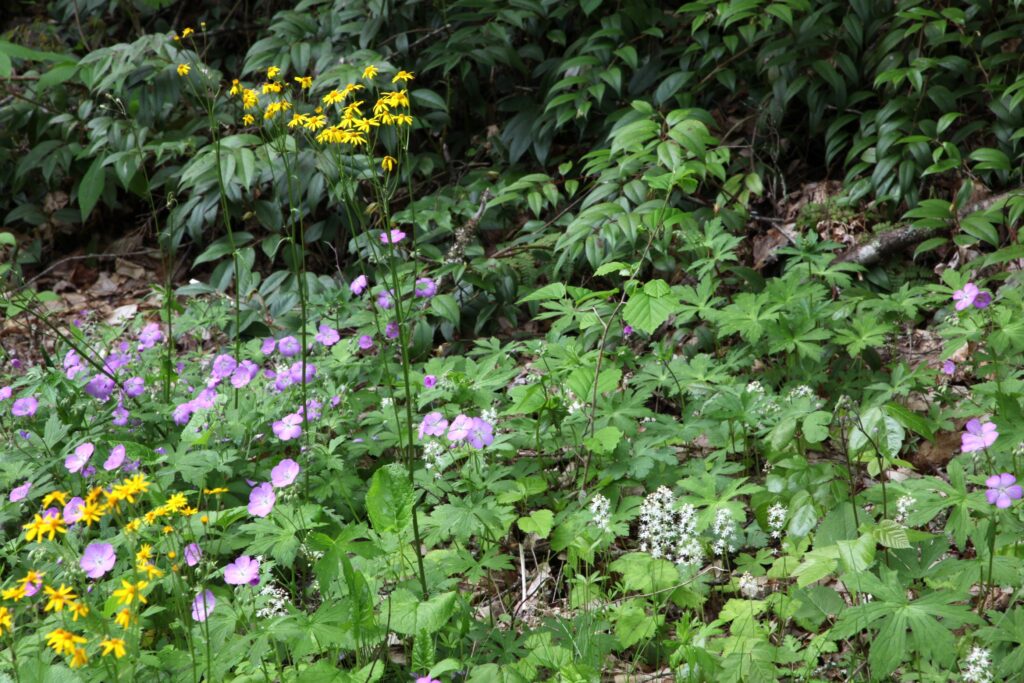WSSA member scientists work tirelessly to protect our ecosystems from destructive plant species

WESTMINSTER, Colorado – 16 April 2025 – April is Native Plant Month, and the Weed Science Society of America (WSSA) encourages the public to support initiatives like this one that increase awareness for the need to protect native plants that are vital to local ecosystem health.
“Now is a perfect time to remind the public about the need to protect our ecosystems from harmful weeds and invasive plants, which can disrupt native plant and animal habitat, impede waterways, and escalate fire and safety hazards,” says Hilary Sandler, Ph.D., and WSSA president. “We applaud our WSSA member scientists, who work tirelessly across the nation to protect habitats from weeds and invasive plant species that threaten our native plants and ecosystems.”
One recent success involves Shawn Askew, Ph.D., a WSSA member scientist and Virginia Tech professor who led a Virginia Department of Transportation (VDOT) study to evaluate sustainable roadside vegetation management by integrating native plant species into its policies and practices. Research findings from the study indicate that native plants can improve soil stabilization while also enhancing biodiversity and supporting critical pollinator habitats. The researchers evaluated 490 sites statewide and identified 616 unique plant species among the 67,330 plants surveyed, with at least one milkweed species on 37 sites statewide (7.6%).

Another success is WSSA collaboration with GROW (Getting Rid of Weeds). Each year, weed scientists and communications professionals at GROW come together to craft and publish dozens of news stories, factsheets, educational webpages, videos, webinars and digital tools on weed and invasive plant management, herbicide resistance and integrated weed management.
Most recently, the organization has published new educational resources on herbicide resistance, as well as an integrated weed management planner for the Eastern U.S., and a series of farmer-led educational videos and webinars. And now, thanks to a new partnership with the United Soybean Board, GROW is the new communications lead for its longstanding herbicide-resistance management program, Take Action. The Take Action project’s work is housed on the GROW website, including the popular Herbicide Classification chart, produced by Christy Sprague, Ph.D., Michigan State University weed scientist and WSSA member.
GROW’s growth in recent years stems from a desire among the farming community and land managers for more sustainable weed control options, combined with public support. “At the heart of GROW’s success is federal funding,” says GROW Director of Outreach and Extension, Emily Unglesbee. “USDA grant funding has been a stable foundation for the organization. It has allowed us to maintain and expand our communications staff and most importantly, remain impartial and science-focused, as we generate research, news and resources on sustainably managing weeds for the farming community.”
Government funding is key to supporting research that might otherwise be left undone, agrees WSSA’s Sandler. “We are grateful for the collaborative work that WSSA member scientists perform with many state, federal, and non-profit organizations, which often rely on government financing to conduct research and protect native plants and ecosystems,” says Sandler.
Other WSSA invasive plant management success stories are listed on its Invasive Plants webpage. For more information about WSSA’s initiatives on invasive plant species, visit: https://wssa.net/weed/invasive-plants/. For more about invasive plant research, visit the Invasive Plant Science and Management journal, at this link. WSSA also has a composite list of weeds, which includes 3759 plants (2847 unique species and 912 synonymic names), available at: https://wssa.net/weed/composite-list-of-weeds/.
About the Weed Science Society of America
The Weed Science Society of America (WSSA), a nonprofit scientific society, was founded in 1956 to encourage and promote the development of knowledge concerning weeds and their impact on the environment. The Society promotes research, education and extension outreach activities related to weeds, provides science-based information to the public and policy makers, fosters awareness of weeds and their impact on managed and natural ecosystems, and promotes cooperation among weed science organizations across the nation and around the world. For more information, visit www.wssa.net.
Contact:
Lee Van Wychen
Executive Director of Science Policy
National & Regional Weed Science Societies
[email protected]
202-746-4686
